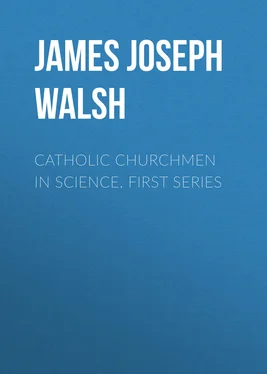James Walsh - Catholic Churchmen in Science. First Series
Здесь есть возможность читать онлайн «James Walsh - Catholic Churchmen in Science. First Series» — ознакомительный отрывок электронной книги совершенно бесплатно, а после прочтения отрывка купить полную версию. В некоторых случаях можно слушать аудио, скачать через торрент в формате fb2 и присутствует краткое содержание. Жанр: foreign_prose, foreign_religion, foreign_antique, на английском языке. Описание произведения, (предисловие) а так же отзывы посетителей доступны на портале библиотеки ЛибКат.
- Название:Catholic Churchmen in Science. First Series
- Автор:
- Жанр:
- Год:неизвестен
- ISBN:нет данных
- Рейтинг книги:4 / 5. Голосов: 1
-
Избранное:Добавить в избранное
- Отзывы:
-
Ваша оценка:
- 80
- 1
- 2
- 3
- 4
- 5
Catholic Churchmen in Science. First Series: краткое содержание, описание и аннотация
Предлагаем к чтению аннотацию, описание, краткое содержание или предисловие (зависит от того, что написал сам автор книги «Catholic Churchmen in Science. First Series»). Если вы не нашли необходимую информацию о книге — напишите в комментариях, мы постараемся отыскать её.
Catholic Churchmen in Science. First Series — читать онлайн ознакомительный отрывок
Ниже представлен текст книги, разбитый по страницам. Система сохранения места последней прочитанной страницы, позволяет с удобством читать онлайн бесплатно книгу «Catholic Churchmen in Science. First Series», без необходимости каждый раз заново искать на чём Вы остановились. Поставьте закладку, и сможете в любой момент перейти на страницу, на которой закончили чтение.
Интервал:
Закладка:
To those familiar with the times, it may be a source of surprise to think of Copernicus, interested as we know him to have been in literature and devoted so cordially to astronomy, yet taking up medicine as a profession. He seems, however, to have been led to do so by his distinguished teacher, Novara, who realized the talent of his Polish pupil for mathematics and astronomy and yet felt that he should have some profession in life. A century ago Coleridge, the English writer, said that a literary man should have some other occupation. Oliver Wendell Holmes improved upon this by adding: "And, as far as possible, he should confine himself to the other occupation." Novara seems to have realized that Copernicus might be under the necessity of knowing how to do something else besides making astronomical observations, in order to gain his living; and as medicine was satisfyingly scientific, the old teacher suggested his taking it up as a profession. Copernicus made his medical studies in Ferrara and Padua, and obtained his doctorate with honors from Ferrara.
Copernicus seems to have taken up the practice of his profession seriously, and to have persevered in it to the end of his life. His biographers say that in the exercise of his professional duties he was animated by the spirit of a person who had devoted himself to the ecclesiastical life. While he did not publicly practise his profession, he was ever ready to assist the poor; and he also acquired great reputation in the surrounding country for his medical attendance upon clerics of all ranks. This continued to be the case, notwithstanding the fact that after the death of his uncle his mother inherited considerable wealth, and the family circumstances changed so much that he might well have given up any labors that were meant only to add to his income. In a word, he seems to have had a sincere interest in his professional work, and to have continued its exercise because of the opportunities it afforded for the satisfaction of a mind devoted to scientific research.
Copernicus acquired considerable reputation by his medical services. His friend Giese speaks of him as a very skilful physician, and even calls him a second AEsculapius. Maurice Ferber, who became Bishop of Ermland in 1523, suffered from a severe chronic illness that began about 1529. He obtained permission from the canons of the cathedral to have Doctor Copernicus, whose ability and zeal he never ceased to praise, to come from the cathedral town where he ordinarily resided to Heilsburg, in order to have him near him. Bishop Ferber's successor, Dantisco, also secured Copernicus's aid in a severe illness, and declared that his restoration to health was mainly due to the efforts of his learned physician. Giese was so confident of the Doctor's skill that when he became Bishop of Kulm and on one of his episcopal visitations fell ill at a considerable distance from Copernicus's place of residence, he insisted on having the astronomer doctor brought to take care of him.
In 1541 Duke Albert of Prussia became very much worried over the illness of one of his most trusted counsellors. In his distress he had recourse to Copernicus, and his letter asking the Canon of the Cathedral of Frauenburg to come to attend the patient is still extant. He says that the cure of the illness is "very much at his heart"; and, as every other means has failed, he hopes Copernicus will do what he can for the assistance of his faithful and valued counsellor. Copernicus yielded to the request, and the counsellor began to improve shortly after his arrival. At the end of some weeks the Duke wrote again to the canons of the cathedral asking that the leave of absence granted to Copernicus should be extended in order to enable him to complete the cure which had been so happily begun. In this second letter the Duke talks of Copernicus as a most skilful and learned physician. At the end of the month there is a third letter from the Duke, in which he thanks all the canons of the cathedral for their goodness in having granted the desired permission, and he adds that he shall ever feel under obligations "for the assistance rendered by that very worthy and excellent physician, Nicholas Copernicus, a doctor who is deserving of all honor." Not long afterward, when Copernicus's book on astronomy was published, a copy of it was sent to the Duke, and he replied that he was deeply grateful for it, and that he should always preserve it as a souvenir of the most learned and gentlest of men.
There are a number of notes on the art of medicine made by Copernicus in the books of the cathedral library at Frauenburg. They serve to show how faithful a student he was, and to a certain extent give an idea of the independent habit of mind which he brought to the investigation of medicine as well as to the study of astronomy. Unfortunately, these have not as yet found an editor; but it is to be hoped that we shall soon know more of the medical thinking of a man over whose mind tradition, in the unworthier sense of that word, exercised so little influence.
In 1530 Copernicus wrote a short prelude to the longer work on astronomy which he was to publish later. The propositions contained in this work show how far he had advanced on the road to his ultimate discovery. After a few words of introduction, the following seven axioms are laid down:–
1. The celestial spheres and their orbits have not a single center.
2. The center of the earth is not the center of the universe, but only the center of gravity and of the moon's orbit.
3. The planes of the orbits lie around the sun, which may be considered as the center of the universe.
4. The distance from the earth to the sun compared with that from the earth to the fixed stars is extremely small.
5. The daily motion of the heavenly sphere is apparent that is, it is an effect of the rotary motion of the earth upon it axis.
6. The apparent motions of the moon and of the sun are so different because of the effect produced by the motion of the earth.
7. The movements of the earth account for the apparent retrograde motion and other irregularities of the movements of the planets. It is enough to assume that the earth alone moves, in order to explain all the other movements observed in the heavens.
It is no wonder that one of his bishop-friends, Frisio, writing to another bishop-friend, Dantisco, said: "If Copernicus succeeds in demonstrating the truth of his thesis–and we may well consider that he will from this prelude–he will give us a new heaven and a new earth." This shorter exposition of Copernicus's views was found in manuscript in the imperial library in Vienna only about a quarter of a century ago. It is mentioned by Tycho Brahe in one of his works on astronomy in which he reviews the various contemporary advances made in the knowledge of the heavens.
The publication of Copernicus's great work, "De Revolutionibus Orbium Celestium," was delayed until he was advanced in years, because his astronomical opinions were constantly progressing; and, with the patience of true genius, he was not satisfied with anything less than the perfect expression of truth as he saw it. It has sometimes been said that it was delayed because Copernicus feared the storm of religious persecution which he foresaw it would surely arouse. How utterly without foundation is this pretence, which has unfortunately crept into serious history, can be seen from the fact that Pope Paul III accepted the dedication of the work; and of the twelve popes who immediately followed Paul not one even thought of proceeding against Copernicus's work. His teaching was never questioned by any of the Roman Congregations for nearly one hundred years after his death. Galileo's injudicious insistence in his presentation of Copernicus's doctrine, on the novelties of opinion that controverted long-established beliefs, was then responsible for the condemnation by the Congregation of the Index; and, as we shall see, this was not absolute, but only required that certain passages should be corrected. The corrections demanded were unimportant as regards the actual science, and merely insisted that Copernicus's teaching was hypothesis and not yet actual demonstration.
Читать дальшеИнтервал:
Закладка:
Похожие книги на «Catholic Churchmen in Science. First Series»
Представляем Вашему вниманию похожие книги на «Catholic Churchmen in Science. First Series» списком для выбора. Мы отобрали схожую по названию и смыслу литературу в надежде предоставить читателям больше вариантов отыскать новые, интересные, ещё непрочитанные произведения.
Обсуждение, отзывы о книге «Catholic Churchmen in Science. First Series» и просто собственные мнения читателей. Оставьте ваши комментарии, напишите, что Вы думаете о произведении, его смысле или главных героях. Укажите что конкретно понравилось, а что нет, и почему Вы так считаете.












